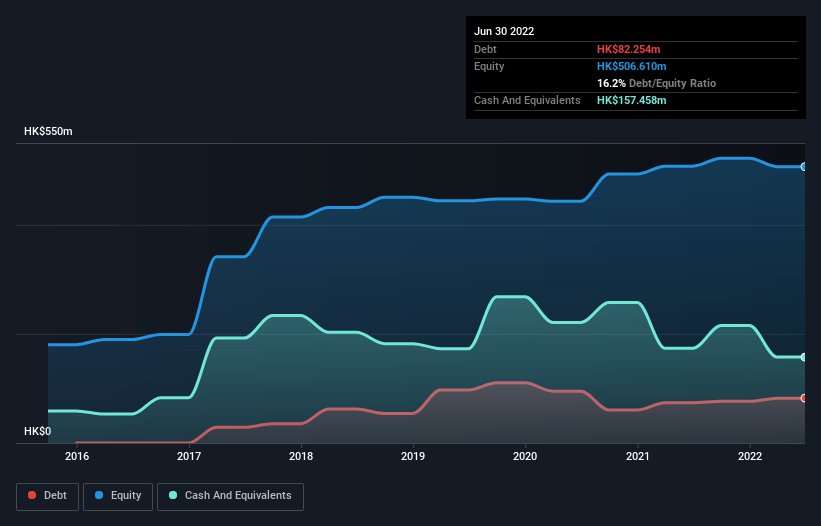Warren Buffett famously said, 'Volatility is far from synonymous with risk.' So it seems the smart money knows that debt - which is usually involved in bankruptcies - is a very important factor, when you assess how risky a company is. Importantly, C Cheng Holdings Limited (HKG:1486) does carry debt. But the real question is whether this debt is making the company risky.
When Is Debt Dangerous?
Debt assists a business until the business has trouble paying it off, either with new capital or with free cash flow. Part and parcel of capitalism is the process of 'creative destruction' where failed businesses are mercilessly liquidated by their bankers. However, a more common (but still painful) scenario is that it has to raise new equity capital at a low price, thus permanently diluting shareholders. Having said that, the most common situation is where a company manages its debt reasonably well - and to its own advantage. When we think about a company's use of debt, we first look at cash and debt together.
Check out our latest analysis for C Cheng Holdings
How Much Debt Does C Cheng Holdings Carry?
The image below, which you can click on for greater detail, shows that at June 2022 C Cheng Holdings had debt of HK$82.3m, up from HK$74.0m in one year. But it also has HK$157.5m in cash to offset that, meaning it has HK$75.2m net cash.

A Look At C Cheng Holdings' Liabilities
We can see from the most recent balance sheet that C Cheng Holdings had liabilities of HK$271.2m falling due within a year, and liabilities of HK$58.7m due beyond that. Offsetting this, it had HK$157.5m in cash and HK$470.4m in receivables that were due within 12 months. So it can boast HK$297.9m more liquid assets than total liabilities.
This excess liquidity is a great indication that C Cheng Holdings' balance sheet is almost as strong as Fort Knox. With this in mind one could posit that its balance sheet means the company is able to handle some adversity. Simply put, the fact that C Cheng Holdings has more cash than debt is arguably a good indication that it can manage its debt safely. There's no doubt that we learn most about debt from the balance sheet. But you can't view debt in total isolation; since C Cheng Holdings will need earnings to service that debt. So when considering debt, it's definitely worth looking at the earnings trend. Click here for an interactive snapshot.
Over 12 months, C Cheng Holdings made a loss at the EBIT level, and saw its revenue drop to HK$777m, which is a fall of 6.6%. We would much prefer see growth.
So How Risky Is C Cheng Holdings?
While C Cheng Holdings lost money on an earnings before interest and tax (EBIT) level, it actually generated positive free cash flow HK$14m. So taking that on face value, and considering the net cash situation, we don't think that the stock is too risky in the near term. There's no doubt the next few years will be crucial to how the business matures. There's no doubt that we learn most about debt from the balance sheet. However, not all investment risk resides within the balance sheet - far from it. Case in point: We've spotted 2 warning signs for C Cheng Holdings you should be aware of, and 1 of them makes us a bit uncomfortable.
If, after all that, you're more interested in a fast growing company with a rock-solid balance sheet, then check out our list of net cash growth stocks without delay.
New: AI Stock Screener & Alerts
Our new AI Stock Screener scans the market every day to uncover opportunities.
• Dividend Powerhouses (3%+ Yield)
• Undervalued Small Caps with Insider Buying
• High growth Tech and AI Companies
Or build your own from over 50 metrics.
Have feedback on this article? Concerned about the content? Get in touch with us directly. Alternatively, email editorial-team (at) simplywallst.com.
This article by Simply Wall St is general in nature. We provide commentary based on historical data and analyst forecasts only using an unbiased methodology and our articles are not intended to be financial advice. It does not constitute a recommendation to buy or sell any stock, and does not take account of your objectives, or your financial situation. We aim to bring you long-term focused analysis driven by fundamental data. Note that our analysis may not factor in the latest price-sensitive company announcements or qualitative material. Simply Wall St has no position in any stocks mentioned.
About SEHK:1486
C Cheng Holdings
An investment holding company, provides architectural services in Mainland China, Hong Kong, the Middle East and North Africa, Macau, and internationally.
Excellent balance sheet and good value.
Market Insights
Community Narratives



